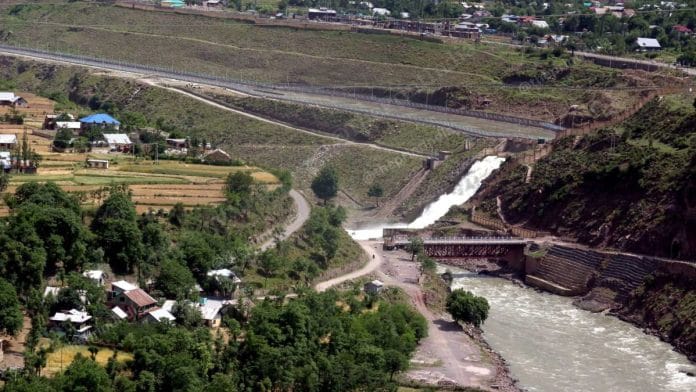New Delhi: Blood and water cannot “flow together”—this is the cost of terrorism India has conveyed to Pakistan by holding the Indus Waters Treaty in abeyance following the terrorist attack in Jammu and Kashmir’s Pahalgam, which left 26 dead.
There was an understanding that the costs for engaging in terrorism will be raised for Pakistan, following the Pahalgam terrorist attack, said sources. “There has to be a cost for terrorism. Blood and water cannot flow together,” a source said.
The source added: “On the political vector, the central measure was that the cost of terrorism for Pakistan will rise. This is why we were driven to hold the Indus Waters Treaty in abeyance. It shows how big a line the terrorist attack in Pahalgam crossed, for the cost of terrorism to be raised in this fashion for Pakistan.”
The measure to hold the Indus Waters Treaty in abeyance was announced a day after the terrorist attack, following the meeting of the Committee on Cabinet Security (CCS) on 23 April. The CCS also imposed a number of other punitive measures, including the expulsion of three defence advisers and annulling the posts in Islamabad’s mission in New Delhi, the closure of the Attari border and the revocation of a number of visas for Pakistani nationals.
All the measures remain in place. The understanding reached between the Director General of Military Operations (DGMO) of India and Pakistan Saturday afternoon is solely on the cessation of hostilities on land, in the air and the sea.
In response to the terrorist attack in Pahalgam, India launched Operation Sindoor on 7 May, targeting nine terrorist complexes, including the home of the United Nations proscribed organisation the Jaish-e-Mohammed, the Markaz Subhan Allah in Bahawalpur, the Markaz Taiba in Muridke, which is the headquarters of the Lashkar-e-Taiba and camps in Muzaffarabad.
The nine sites were “carefully selected” and hit with precision strikes in the early hours of Wednesday morning. About 20 minutes after the strikes, a note was sent to the DGMO of Pakistan, in which India took credit for the strikes on the terrorist infrastructures and made it clear that if Islamabad wishes to talk, New Delhi is ready, sources said.
While the two DGMOs agreed to the cessation of hostilities, a second call is set for 12 pm on 12 May. However, according to sources, Operation Sindoor is not over and a new normal has been set for the relationship between India and Pakistan—any act of terrorism will have a cost and any military response from Islamabad will lead to a harder response from New Delhi.
This message was also communicated by Prime Minister Narendra Modi to US Vice-President J.D. Vance during the talks both held on the night of 9 May. Hours later, Pakistan attempted its widest range of attacks yet, looking to hit at least 26 areas, which were thwarted by the Indian Armed Forces, with limited damage to infrastructure and personnel.
In its response, India struck at eight air bases in Pakistan, which was revealed Saturday morning during a special briefing by Foreign Secretary Vikram Misri, along with Wing Commander Vyomika Singh and Colonel Sofiya Quereshi.
Indus Waters Treaty needs for 21st century
The Indus Waters Treaty first signed in 1960 has survived three wars between India and Pakistan and a number of cross-border skirmishes and over four decades of terrorism. The Treaty was one of the enduring ties between the two countries.
However, India has been pushing for the re-negotiation of the treaty over the past 18 months or so, especially as the needs of today were drastically different from when the agreement was first signed. Pakistan has not responded to any of India’s requests.
“Article 12(3) of the Treaty provides for negotiations for a new treaty. Pakistan’s stonewalling for the negotiations of the Treaty in some sense is a violation of the treaty. If you read the preamble of the Treaty, it says it was signed in the ‘spirit of goodwill and friendship’ principles which Pakistan have held in abeyance through its support for terrorists,” said the source, adding, “The impact of terrorism in Jammu and Kashmir has been such that we ourselves cannot use the waters which we have a right over as per the treaty. This allows us to hold the Indus Waters Treaty in abeyance.”
The source was clear that the Treaty will remain in abeyance as long as cross-border terrorism emanating from Pakistan continuesm.
For India, the source added, the Indus Waters Treaty needs to be made “fit for purpose” in the 21st century. “There is a need for the treaty to come into alignment with the engineering techniques available now,” said the source, while adding that with climate change, glacial melt, demographic changes, and the need for renewable energy, all make a strong case for relooking at the rights and obligations of the treaty.
(Edited by Zinnia Ray Chaudhuri)
Also read: Op Sindoor still on, Modi told Vance ‘if Pakistan hits, Indian response will be more devastating’






